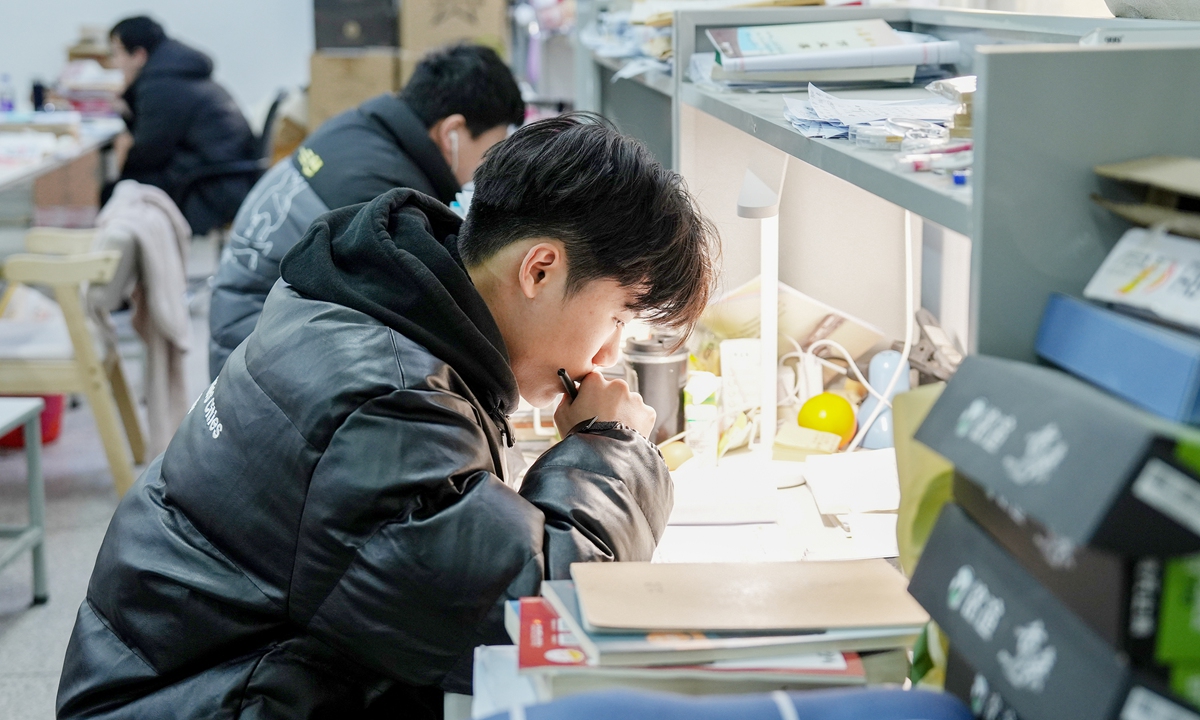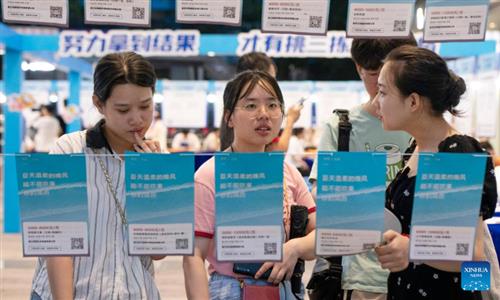
Students review for the college entrance exam in a self-study room at a school in East China's Jiangsu Province, on December 19, 2023. Photo: IC
China has become a major power in graduate education with graduate students on campus reaching 3.65 million in 2022, the second largest in the world, China's Ministry of Education (MOE) said on Tuesday, urging for a change in the attitude that prioritizes academic degrees over professional degrees in graduate education in order to build a strong power of education.Educational experts called for a reform of the talent evaluation system, which is only based on academic qualifications, saying "blind" expansion of graduate student numbers instead of improving the quality of graduate education will lead to the devaluation of academic qualifications.
At present, the number of academic doctorate programs at Chinese universities has doubled from 10 years ago, while the number of professional doctorate programs has increased three-fold, according to the MOE's Tuesday press briefing, which introduced the ministry's advice on further promoting the differentiated development of graduate education for academic and professional degrees that the ministry previously issued.
However, Xiong Bingqi, director of the 21st Century Education Research Institute in Beijing, emphasized the importance of ensuring the quality of graduate student training. He told the Global Times on Tuesday that the expansion of graduate students should be kept within an appropriate range.
According to Xiong, now that higher education has entered the popularization era, China has to form a reasonable talent training system that doesn't solely focus on educational background but also values talents' core capabilities and performance quality.
At present, the homogeneous development of academic and professional degrees in graduate education still exists and a further reverse of the attitude that prioritizes academic degrees over professional degrees in graduate education is needed, Ren Youqun, head of the MOE's Department of Teacher Education, noted during the Tuesday briefing.
According to the MOE, the basic paradigm of differentiated development of graduate education for academic and professional degrees has basically taken shape in China with both academic and professional degrees equally valued.
The proportion of professional degrees increased from 32.29 percent in 2012 to 56.4 percent in 2022, and the current proportion of graduate students on campus for professional degrees accounted for 61.6 percent, more precisely meeting the economic and social needs for the high-quality development of these industries.
According to Ren, the number of fresh doctoral graduates reached 75,200 in 2023. Their employment data as of the end of August shows that fewer than 40 percent were recruited by colleges and scientific research institutes.
Besides this, more than one-fifth of the fresh PhD holders were hired by enterprises, a proportion which has been increasing for three years in a row. Ren said that the proportion is still not as high as those in some advanced countries and the demand for doctoral talents in society will continue to increase in the future, while the requirements on the quality and capabilities of high-level talents will also be more diversified.
According to Ren, the MOE's advice clarifies that both academic degrees and professional degrees are crucial for the country to cultivate high-level innovative talents, and they should be equally valued by educational institutions.
The two types of degrees have different goals in cultivating talents, but both emphasize theoretical knowledge, systematic specialized knowledge, and innovative spirit and capabilities. Additionally, professional degrees cannot solely focus on the training of professional skills.
According to Xiong, dividing graduate education into academic degrees and professional degrees is a fundamental adjustment to the structure of talent cultivation, rather than a simple change in terminology.




